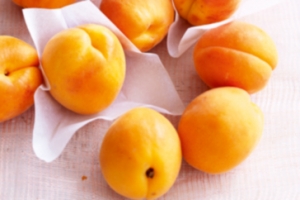Apricots
Delicious fresh or dried, apricots are both nutritious and versatile.

Mark O'Meara
A closer relative of plums and peaches, the apricot is at its peak in summer.
Buying and storing
Choose plump fruit with deep yellow-orange colour and no bruising. The flesh should give slightly when pressed. Store ripe apricots in the fridge; if not quite ripe, leave to ripen at room temperature for a few days in a brown paper bag.
Preparation
Use a knife to cut through the apricot, following the crease. Open and remove the stone. To peel, immerse whole apricots briefly in boiling water, then remove with a slotted spoon and place in a bowl of cold water. The skins should now be easy to remove.
Nutrition
Apricots contain vitamin C for healthy skin and immunity, potassium for regulating blood pressure and fibre for good digestive health. Their golden colour signals the presence of protective antioxidants including carotenoids, lutein and zeaxanthin for healthy eyes. Apricots have a low glycemic index (GI), which means they help maintain optimal blood glucose levels, help manage hunger and provide longer-lasting energy.
Source
Super Food Ideas — November 2011 , Page 10
Author
Katrina Woodman

















